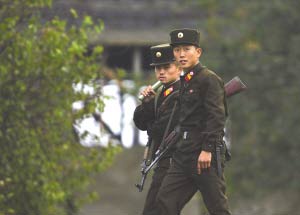Villagers' secret exchanges vanish
Legal trade between retailers in Northeast China and the Democratic People's Republic of Korea may be booming but illegal dealing is quickly becoming a thing of the past, say villagers.
|
|
|
DPRK soldiers are seen on borders. [File photo] |
Only a tributary of the Yalu River separates people living in Hukou, a village 16 km north of Dandong, from their Korean neighbors. Many admitted they had taken part in secret exchanges.
However, as the site is close to a tourist attraction, families here will be relocated next year - spelling an end to the trading.
Liu, a villager in his 40s who did not give his full name, said people here often swap food, garments, cigarettes and alcohol in return for lumps of lead, iron and steel. The waterway is usually shallow enough for people to wade across with small items.
"Because of the exchange rate, both sides make money," he explained.
During the 1980s and 1990s, at least three-quarters of the 70 households traded illegally with the Koreans, said villagers.
Residents today broker deals by using cell phones. Although the DPRK does not have a mobile network, those living along the border can use the Chinese signal. Hukou residents provide the handsets.
"We don't know whether these exchanges are illegal or not. It's just convenient for residents on both sides," said a villager named Cheng.
The 69-year-old's neighbors joked that her son was able to build a house with the money he made after 10 years of making secret deals. Cheng did not deny the rumor; she would only say that trade with the Koreans had already started to fall sharply.
Cheng also recalled the tale of a farmer named Lee from the DPRK who drowned in the Yalu River 13 years ago.
"He was going to trade iron plates with a Chinese villager but he fell into the water," she said. "His son grabbed his hand to pull him out but the iron on Lee's back was too heavy. They both drowned."
 0
0 








Go to Forum >>0 Comments